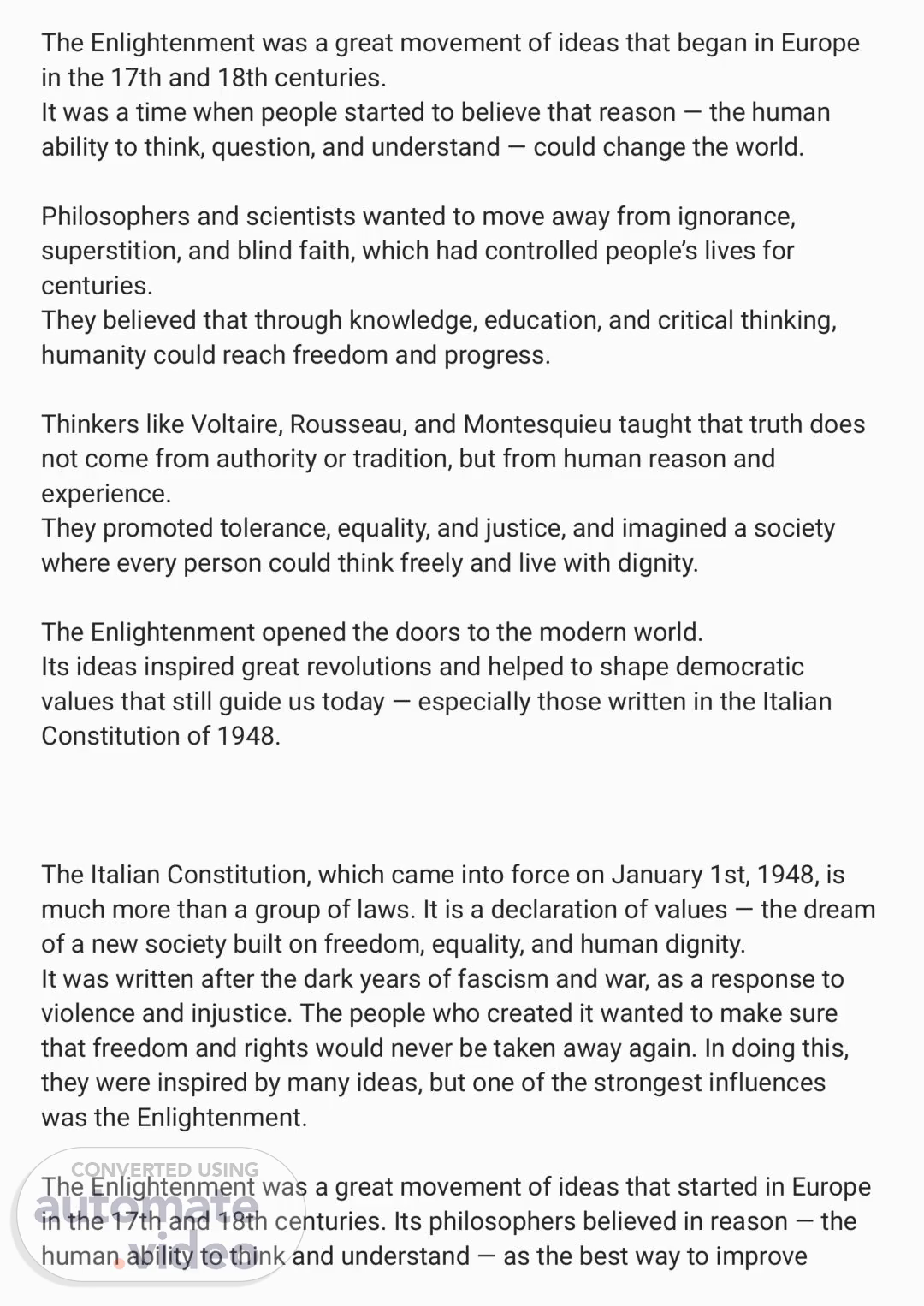Scene 1 (0s)
[Audio] The Enlightenment period in Europe during the 17th and 18th centuries marked the beginning of a significant shift in societal attitudes towards reason and intellectual inquiry. People began questioning established traditions and institutions, seeking answers through rational thought and empirical evidence. Philosophers and scientists of the time, including notable figures such as Voltaire, Rousseau, and Montesquieu, challenged long-standing dogma and superstitions, advocating for a more informed and educated citizenry. These influential thinkers emphasized the importance of critical thinking, tolerance, and equality, laying the groundwork for future social and political reforms. Their ideas had far-reaching consequences, influencing the development of democracy and shaping the course of modern history. The principles of the Enlightenment continue to inspire and guide contemporary societies, serving as a foundation for human rights and freedoms. The Italian Constitution of 1948, which enshrined fundamental rights and freedoms, reflects the enduring legacy of the Enlightenment, demonstrating its relevance in modern times. By promoting the values of reason, individual liberty, and collective responsibility, the Enlightenment remains an essential component of Western cultural heritage..
Scene 2 (1m 26s)
[Audio] The ideas of the Enlightenment are incorporated into the Italian Constitution, emphasizing the importance of human rights, equality, and popular sovereignty. The Constitution recognizes and protects the inviolable rights of every person, while also acknowledging the duties of political, economic, and social solidarity. Equality is a fundamental principle, with Article 3 aiming to eliminate economic and social obstacles that hinder freedom and equality. The concept of popular sovereignty is reflected in Article 1, which states that sovereignty belongs to the people. This represents a significant shift in power dynamics, moving from monarchies and wealthy classes to the collective will of citizens..
Scene 3 (2m 13s)
[Audio] The protection of people's freedom is a fundamental aspect of the Italian Constitution, which is deeply rooted in the Enlightenment ideals of political liberty. According to Article 13, personal freedom is guaranteed, while Article 19 safeguards the freedom of religion. Furthermore, Article 21 ensures that individuals have the right to express their thoughts freely, regardless of the medium. These rights embody the spirit of the Enlightenment, which championed the cause of a free human being. Additionally, the Constitution acknowledges the importance of property as a component of personal freedom, as recognized by Article 42, which incorporates the concept of social function. This means that property should not only benefit its owner but also contribute to the greater good. In line with Enlightenment thought, the Italian Constitution promotes economic freedom while emphasizing the need for social justice. Another key legacy of the Enlightenment is the separation of powers, a concept introduced by Montesquieu. The Constitution's structure, which divides legislative, executive, and judicial functions among separate branches, mirrors this principle. The presence of institutions like the Constitutional Court and the President of the Republic further reinforces the balance between powers and defends citizens' rights. Overall, the Italian Constitution represents a modern interpretation of Enlightenment values, prioritizing the protection of individual freedoms and promoting a rational, legal system..
Scene 4 (3m 50s)
[Audio] The Italian Constitution builds upon the Enlightenment's emphasis on education as a key factor in achieving true progress. It ensures that schools are accessible to everyone, guaranteeing the right to education and freedom of teaching. Furthermore, the Constitution sees education as a civic duty, recognizing that well-informed citizens are essential for active participation in democracy and defending individual freedoms. By incorporating these principles, the Italian Constitution creates a more comprehensive framework for promoting liberty, equality, reason, and human dignity. The Constitution's addition of solidarity, social justice, and responsibility to its interpretation of these values further enhances the protection of fundamental rights. In essence, the Italian Constitution represents the maturation of Enlightenment ideals into practical policies, fostering a society grounded in mutual respect, collective involvement, and human dignity. The enduring relevance of these principles underscores the importance of safeguarding freedom and justice, making them ongoing objectives worthy of continuous pursuit..
